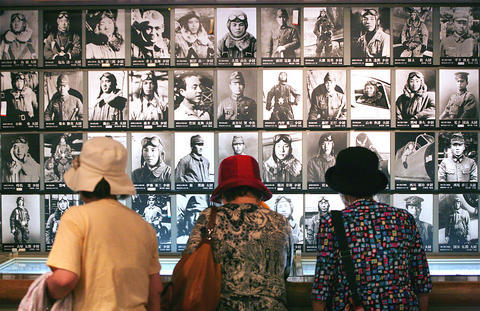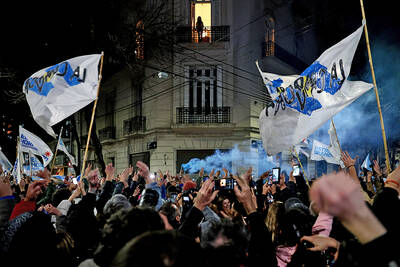On April 12, 1945, Lieutenant Shinichi Uchida faced a terrifying mission -- crash his plane into a US warship. But the young kamikaze's final letter to his grandparents was full of bravado.
"Now I'll go and get rid of those devils," the 18-year-old wrote shortly before his final flight, vowing to "bring back the neck" of President Franklin Roosevelt. He never returned.
For many, such words are redolent of the militarism that drove Japan to ruin in World War II. But for an increasingly bold cadre of conservatives, Uchida's words symbolize something else: just the kind of guts and commitment that Japanese youth need today.

PHOTO: AP
Long a synonym for the waste of war, the suicidal flyers are now being glorified in a film written by Tokyo Governor Shintaro Ishihara, a well-known nationalist and co-author of the 1989 book The Japan That Can Say No. And a museum about the kamikazes in the southern town of Chiran, near the airstrip where Uchida and others took off, gets more than 500,000 visitors a year.
"The worries, sufferings, and misgivings of these young people ... are something we cannot find in today's society," Ishihara said when his movie, I Go to Die For You, opened this spring.
"That is what makes this portrait of youth poignant and cruel, and yet so exceptionally beautiful," he said.
No one is publicly calling for young Japanese to kill themselves for the nation these days. But the renewed hero-worship of the kamikazes coincides with a general trend in Japanese society toward seeing the country's war effort as noble, and mourning the fading of the ethic of self-sacrifice amid today's wealth.
The government has stepped up efforts to expunge accounts of Japanese atrocities from history books and reinstate patriotic instruction in the public schools. Prime Minister Shinzo Abe, like his popular predecessor, Junichiro Koizumi, is pushing to revise the pacifist Constitution.
The estimated 4,000 kamikaze -- or "divine wind" -- pilots were named after a legendary typhoon that foiled the Mongol emperor Kublai Khan's invasion of Japan in 1281. Chiran museum officials say as many as 90 percent failed to reach the US warships they were meant to attack.
Despite the pilots' reputation abroad as suicidal fanatics, Japanese hearts have always had a soft spot for the kamikazes. Long celebrated in movies, books and comic books, the pilots are seen as innocent young men forced by a desperate military into sacrificing their lives to protect their country.
Ishihara's film plays these tragic-hero sentiments to the hilt, with a strong dose of patriotism: Strapping young pilots proudly sing war songs and down cups of sake before taking off, while townspeople kneel in tearful gratitude as they fly overhead. Girls paint Rising Sun flags with their own blood.
The film is set in Chiran, about 1,000km southwest of Tokyo. From here 402 pilots took off, among them Uchida, whose fate remains unknown.
Today's kamikaze-boosters deny they are pro-war, and indeed, the Ishihara film does not shy away from the futility of the suicide missions. But the nationalist sentiment is clear.
While insisting to reporters that the movie's message is anti-war, director Taku Shinjo said Japan launched the war in Asia in self-defense, and that the decision to send young men on suicide missions was the only option left as the conflict neared its end.
"When you get to the roots of the Japanese soul, I think they are embodied in the kamikaze pilots," he said.
While the Japanese have not fired a shot in wartime since 1945, critics see peril in the new trend.
"It's extremely dangerous to glorify the kamikaze pilots as tragic heroes. The people who glorify them want to connect the prewar period with the present and future Japan," said Atsushi Shirai, a historian who has written about the pilots.
"These views also block critical analysis of the tragedy of the war, what it signified and why it was carried out," he added.

LANDMARK CASE: ‘Every night we were dragged to US soldiers and sexually abused. Every week we were forced to undergo venereal disease tests,’ a victim said More than 100 South Korean women who were forced to work as prostitutes for US soldiers stationed in the country have filed a landmark lawsuit accusing Washington of abuse, their lawyers said yesterday. Historians and activists say tens of thousands of South Korean women worked for state-sanctioned brothels from the 1950s to 1980s, serving US troops stationed in country to protect the South from North Korea. In 2022, South Korea’s top court ruled that the government had illegally “established, managed and operated” such brothels for the US military, ordering it to pay about 120 plaintiffs compensation. Last week, 117 victims

China on Monday announced its first ever sanctions against an individual Japanese lawmaker, targeting China-born Hei Seki for “spreading fallacies” on issues such as Taiwan, Hong Kong and disputed islands, prompting a protest from Tokyo. Beijing has an ongoing spat with Tokyo over islands in the East China Sea claimed by both countries, and considers foreign criticism on sensitive political topics to be acts of interference. Seki, a naturalised Japanese citizen, “spread false information, colluded with Japanese anti-China forces, and wantonly attacked and smeared China”, foreign ministry spokesman Lin Jian told reporters on Monday. “For his own selfish interests, (Seki)

Argentine President Javier Milei on Sunday vowed to “accelerate” his libertarian reforms after a crushing defeat in Buenos Aires provincial elections. The 54-year-old economist has slashed public spending, dismissed tens of thousands of public employees and led a major deregulation drive since taking office in December 2023. He acknowledged his party’s “clear defeat” by the center-left Peronist movement in the elections to the legislature of Buenos Aires province, the country’s economic powerhouse. A deflated-sounding Milei admitted to unspecified “mistakes” which he vowed to “correct,” but said he would not be swayed “one millimeter” from his reform agenda. “We will deepen and accelerate it,” he

‘HYANGDO’: A South Korean lawmaker said there was no credible evidence to support rumors that Kim Jong-un has a son with a disability or who is studying abroad South Korea’s spy agency yesterday said that North Korean leader Kim Jong-un’s daughter, Kim Ju-ae, who last week accompanied him on a high-profile visit to Beijing, is understood to be his recognized successor. The teenager drew global attention when she made her first official overseas trip with her father, as he met with Chinese President Xi Jinping (習近平) and Russian President Vladimir Putin. Analysts have long seen her as Kim’s likely successor, although some have suggested she has an older brother who is being secretly groomed as the next leader. The South Korean National Intelligence Service (NIS) “assesses that she [Kim Ju-ae]